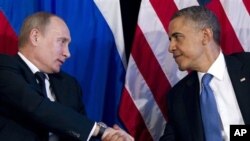WHITE HOUSE —
A letter President Barack Obama wrote to Russian President Vladimir Putin was aimed at paving the way for improved relations, despite recent diplomatic tensions between Moscow and Washington.
Press Secretary Jay Carney confirmed that National Security Adviser Tom Donilon delivered Obama's letter in Moscow. Donilon met Monday with President Putin and other officials.
A White House statement said the talks were "comprehensive and constructive" covering the full range of bilateral and global issues.
It said they were preparation for Obama-Putin talks on the margins of the G8 Summit in Britain in June, and later this year at the G20 Summit in St Petersburg, Russia.
The Donilon talks came amid tensions after the U.S. released a list of Russian officials (called the Magnitsky List) alleged to have been involved in human rights violations. The officials were banned from travel to the U.S. and had U.S. assets frozen.
Moscow responded by listing 18 Americans banned from traveling to Russia, including two officials from the George W. Bush administration whom Russia alleges condoned torture, and two former commanders at Guantanamo Bay.
Jay Carney suggested Russia could take action to resolve the issue.
"One way to resolve this is for the Russian government to take action against, investigate and to take action on those individuals responsible for [Magnitsky's] death. That is the clear, right response to the international outcry over his death, conduct a proper investigation and hold those responsible for his death accountable, rather than engage in tit for tat retaliation," he said.
Carney would not provide details of Obama's letter. He delivered a standard administration response on U.S. - Russian relations, saying the two sides have considerable differences on some issues, but also areas where interests align.
In Moscow, President Putin's foreign affairs adviser, Yuri Ushakov, described Mr. Obama's letter as "quite constructive" with specific proposals on arms control and economic cooperation. He said President Putin expressed readiness to support "positive signals" from Washington.
Steven Pifer, an expert on U.S. - Russia relations with the Brookings Institution, says both sides appear to be looking to move past recent diplomatic tensions.
Pifer says the Donilon visit presented an opportunity to more clearly define issues and areas of common interests, such as nuclear nonproliferation, North Korea, Iran and trade and economic relations.
"So the question is, can the sides begin to work more on those issues where they have converging interests, and then you have a relationship where there are some areas where they are working together, and there will be some issues on which we just disagree and it's better to have that combination than have just a relationship that is focusing only on the problem questions," he said.
Pifer says it is difficult to point to any progress on one major sticking point in relations - what to do about the situation in Syria.
But two months before the first Obama-Putin talks on the sidelines of the G8 Summit, Pifer says he has heard of what he calls a feeling in Moscow that the conversation with Washington has become more useful.





